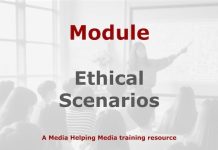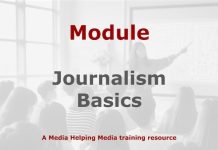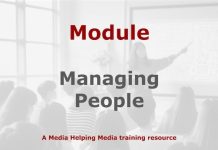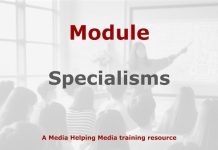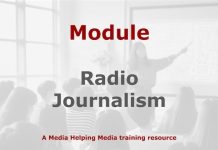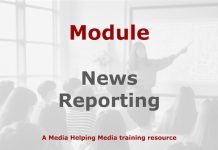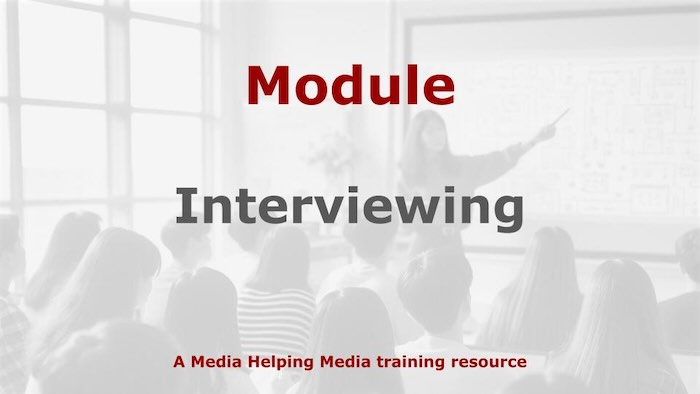 This free six-week module is for teaching journalists how to carry out interviews for news, current affairs, and in-depth programmes.
This free six-week module is for teaching journalists how to carry out interviews for news, current affairs, and in-depth programmes.
It’s designed to be downloaded and adapted by college and university lecturers and trainers to meet local needs.
Introduction
The interview is one of the most powerful and fundamental tools in a journalist’s toolkit. Whether gathering facts in the aftermath of a breaking story, probing a politician’s evasions, or sensitively listening to a traumatised survivor, the journalist must master a range of techniques and approaches.
This six-week module introduces journalism trainees to a spectrum of interview styles. It combines practical skills, ethical considerations, and contextual awareness to help participants become competent, confident, and sensitive interviewers.
By exploring articles from Media Helping Media, this module develops both the technical and interpersonal dimensions of interviewing.
Trainees will reflect on the purpose of interviews, prepare for a variety of scenarios, and learn how to handle difficult conversations with professionalism and integrity.
Week 1 – Foundations of the interview
- Objective:
- Understand the basic principles and purposes of interviews in journalism.
- Learn about the different types of interviews, why they are used and how to conduct them.
- Explore the six questions that all journalists should ask when covering a breaking news story.
- Resources:
- Activities:
- Exercise: Split the class into pairs then ask each pair to interview each other using the six questions of What? Why? When? How? Where? Who?.
- Presentation: Ask members of the class to then report back on what they learnt from the interview.
- Discussion: Group discussion on the outcome of the exercise.
Week 2 – Preparation and techniques
- Objective: Learn how to prepare for and conduct interviews effectively.
- Resources:
- Topics covered:
- Pre-interview research and planning.
- Managing interview settings (in-person, phone, video, email).
- Technical and personal considerations (body language, tone, background).
- The importance of listening and adapting during the interview
- Activities:
- Role-play: interviewer and interviewee simulation in different environments.
- Assignment: Prepare a list of questions for a mock expert interview
Week 3 – Interview formats and styles
- Objective: Explore different types of interviews and understand when to use them.
- Resources:
- Topics covered:
- Types of interviews: breaking news, adversarial, elucidatory, sensitive, celebrity, promotional, collaborative, hostile, vox pop, and email.
- Tactics and tone for each style.
- Special techniques for dealing with evasive or hostile subjects.
- How to use calls-to-action instead of questions to draw more detailed and informative responses from interviewees when conduction in-depth interviews.
- Activities:
- Group presentation: analyse three different interview styles and present case examples.
- Exercises:
- Simulate a vox pop interview and evaluate diversity of voices.
- Simulate a breaking news interview.
- Simulate an interview without questions.
Week 4 – Ethics, bias, and fairness
- Objective: Understand the ethical responsibilities of journalists during interviews.
- Resources:
- Topics covered:
- Ethical interviewing: impartiality, fairness, transparency.
- Recognising and mitigating personal and institutional bias.
- Managing potential conflicts of interest.
- Respecting interviewee dignity and consent.
- Activities:
- Self-assessment: unconscious bias reflection worksheet.
- Debate: Why journalists should not share questions in advance.
Week 5 – Motivations, power dynamics and protection
- Objective: Examine why interviewees speak and how to handle vulnerable or powerful sources.
- Resources:
- Topics covered:
- Understanding interviewee motivations (agenda, reputation, emotion.
- Handling sources with care: survivors, whistleblowers, controversial figures.
- Avoiding manipulation and preserving journalistic independence.
- Activities:
- Small group discussion: review examples of interviews where integrity was compromised or upheld.
- Writing task: draft an ethical plan for interviewing a vulnerable source.
Week 6 – Investigative mindset and final assessments
- Objective: Apply advanced interviewing skills within investigative journalism contexts.
- Resources:
- Topics covered:
- Interviewing for depth: extracting truth from complexity.
- Following up, cross-checking, and verifying claims.
- Persistence, safety, and legal awareness in long-term investigations.
- Recap on course content.
- Activities:
- Final assessment: record or transcribe a 10-minute mock interview in a style of your choice, followed by written reflection.
- Peer feedback and trainer review session.
- Final open floor Q&A.
Conclusion
Interviewing is not just a skill but an ongoing craft. It is a balancing act of preparation and responsiveness, assertiveness and empathy. Through this six-week module, trainees gain insight into the full spectrum of interviews, from quick-fire newsgathering questions to brief vox pops and on to high-stakes political confrontations. Above all, they learn that successful interviewing relies on curiosity, ethics, humility, and respect for those who speak.
